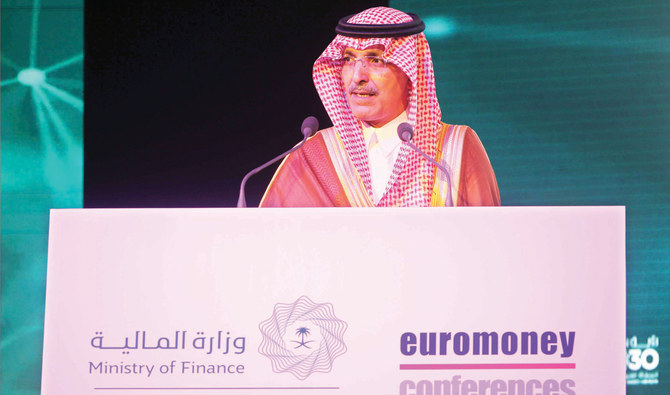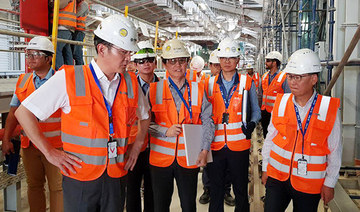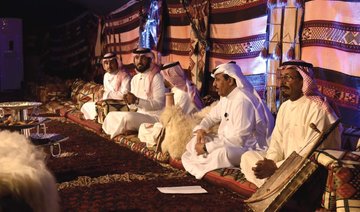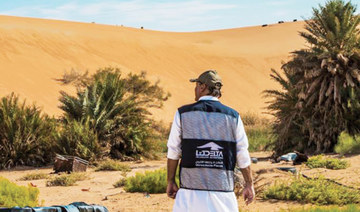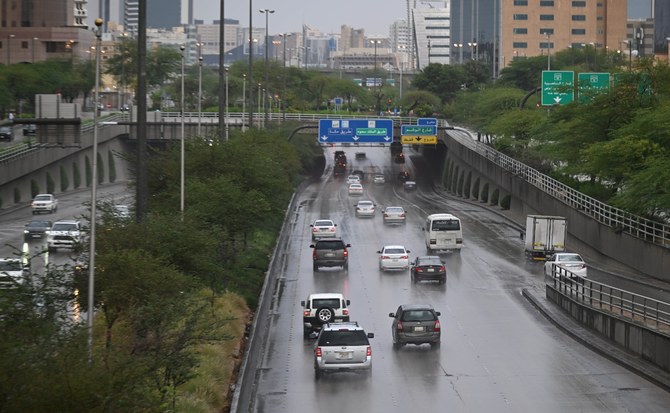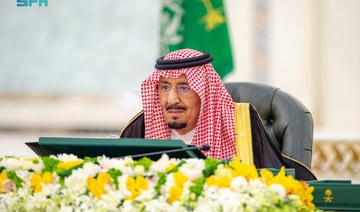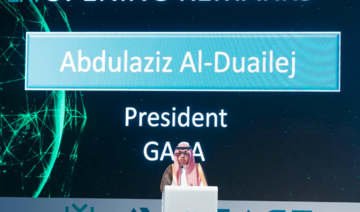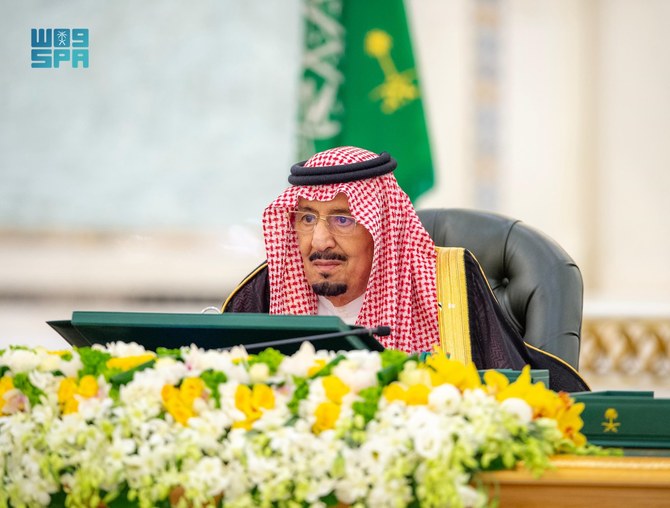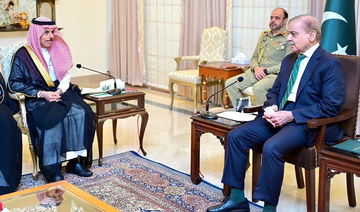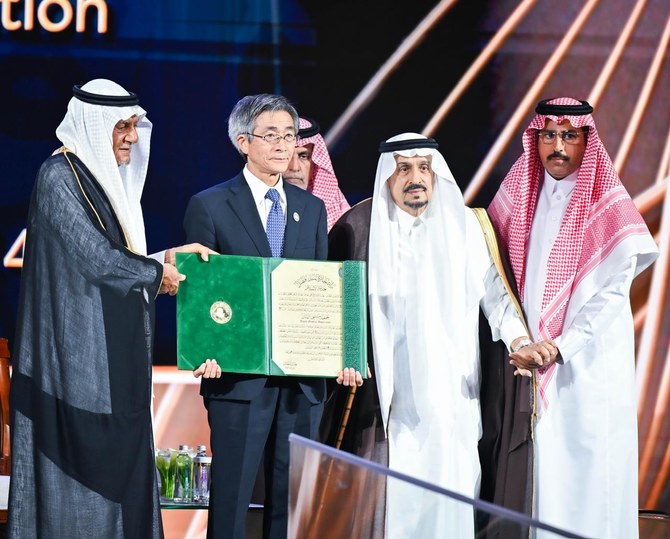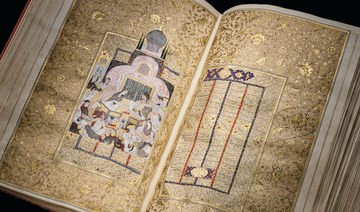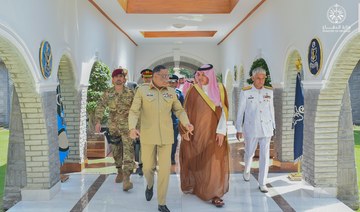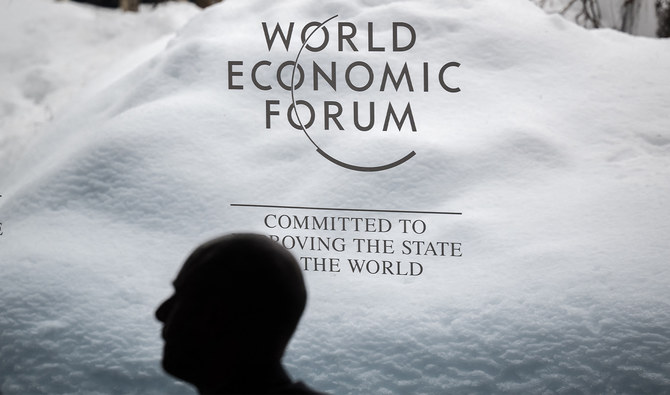RIYADH: Saudi Arabia is committed to working with other nations toward achieving global economic prosperity, Finance Minister Mohammed Al-Jadaan said in his keynote address at the opening of the 14th edition of the Euromoney Saudi Arabia Conference here on Wednesday.
Al-Jadaan also said that the Kingdom’s upcoming presidency of the G20 next year will “consolidate the Kingdom’s international standing and affirm its leadership in supporting the stability of the global economy.”
He added: “Under Saudi Vision 2030 and the Financial Sector Development Program, Saudi Arabia is keeping pace with global developments and achieving qualitative leaps in the field of financial services, in line with business and service development. The growth of talented and active youth, as well as an increase in women’s participation in the labor market, are also important elements toward achieving our goals.”
The minister also welcomed Saudi Arabia’s inclusion in the Financial Action Task Force (FATF), insisting that the Kingdom’s financial sector is “committed to introducing further reforms in order to expand financial services and implement legislation and measures to combat money laundering and the financing of terrorism.”
“Our progress in these areas recently led to the Kingdom’s inclusion in the FATF, taking its place alongside 37 other countries, and it was the first Arab country to (do so),” he added.
Al-Jadaan went on to explain that government spending on economic and social development has increased over the past year.
“The total expenditure growth, in both the operational and capital sectors, reached nearly 16.1 percent in 2018, while the increase in the first half of 2019 reached about 6.3 percent. At the same time, non-oil revenues increased during 2018 by approximately 15.2 percent and the increase continued during the first half of the year by 14.4 percent as a result of the improvement of economic activity and continued implementation of reforms and initiatives aimed at developing revenues and diversifying their sources,” he said.
The budget deficit during the first half of the year amounted to SR5.7 billion ($1.52 billion), compared to SR41.7 billion in the same period in 2018, while the real GDP growth rate in Q1, 2019 was 1.7 percent, compared to 1.4 percent in Q1, 2018, he said. The Kingdom’s non-oil sector grew by 2.1 percent, driven by the private sector’s growth of 2.3 percent, compared to 1.7 percent in the same quarter last year, while FDI inflows increased by 23.8 percent in the first quarter of the current year with increased investment opportunities for the private sector.
The total credit facilities provided by banks and financing companies to SMEs in the first half of 2019 amounted to SR113 billion — an increase of 11.6 percent against the corresponding period last year.
Banking performance also improved, he said, with the total assets and liabilities of commercial banks during Q2, 2019 reaching SR2.4 trillion, an increase of 3 percent — equivalent to SR 69.1 billion — compared to an increase of 0.04 percent in the corresponding quarter of the previous year.
“On the other hand, the demand for investment in domestic and international debt issues increased by more than three times during the first half of the year,” the finance minister said.
He added that the government’s first bond denominated in euros — issued in July — was oversubscribed by over four times, adding, “The nominal value of government sukuk was reduced to SR1,000 in order to diversify the investor segment and enhance trading and individual savings.”
The minister concluded by congratulating the Kingdom and Saudi Aramco for reestablishing full-capacity oil production after the recent drone attacks on oil facilities.
“I would like to take this opportunity to congratulate the country, and Aramco in particular, for bringing production back to normal which proves our ability to deal effectively and efficiently with the unprecedented crisis,” he said.
Minister of Commerce and Investment Majid Al-Qassabi also gave a speech, in which he said that the Kingdom is witnessing a qualitative leap in attracting investors, explaining that 259 licenses for foreign investment were granted in 2015, while 792 have been issued so far this year.
The Kingdom has “undertaken comprehensive reforms to improve the business sector,” he continued, which has led to an almost 60 percent increase in the number of commercial enterprises registered with the Ministry of Commerce and Investment over the last four years — meaning there are now 1,027,000 enterprises registered, compared to 650,000 in 2015.
“The Kingdom has worked on a number of tracks — all of which are aimed at creating an environment conducive to foreign investors: Government restructuring, combating bureaucracy, improving procedures, and preparing legislation that will motivate investors,” said the minister.
He noted that Saudi Vision 2030 has created new sectors for investment and given investors an opportunity to enter new areas, including entertainment, tourism, sports, and logistics.
“We are on a continuous journey of development,” he said. “Vision 2030 is the compass by which we are (navigating), setting goals, and directing investments.”
Al-Qassabi stressed the importance of the SME sector, calling it “the first engine of the country” and explaining that the Kingdom has licensed 50 accelerators and 49 incubators to help support it.
Capital Market Authority (CMA) chairman Mohammed El-Kuwaiz said the CMA is continuing to make “huge advancements” and highlighted the importance of new capital markets laws recently approved by the Cabinet.
“These new laws have two priorities, firstly to protect investors through improved mechanisms for compensation, strengthening the independence of judicial committees, increasing the scope of reporting, rewarding those who report violations and strengthening penalties to deter violators, and secondly to enhance the capital market by modifying financial organization through the introduction of a depository center and the creation of new categories including the establishment of a ‘clearing house’ to create a new derivatives market,” El-Kuwaiz said.
He also outlined how judicial procedures in the capital market have been strengthened. “Prosecution processing time to deal with financial disputes has been reduced from 24 to 10 months, with the aim of a further reduction to 6 months,” he said, adding that many other reforms have also been completed, including the automation of judicial processes for claims. “We are also moving toward the introduction of group claims, which will also help to speed up the process,” he explained.
He also mentioned a range of positive indicators contributing to the growth of the capital market: “There has been an increase of 49 percent in investors in close-end funds, an increase in the index of 6 percent compared to 2018 and foreign cash flow in the capital market has reached SR76 billion.”
The opening day of the Euromoney Saudi Arabia Conference highlighted the transformation of financial institutions in the Kingdom, with a focus on how emerging technologies are driving the explosion of FinTech fueled by digitally savvy millennials.
This year also saw the introduction of an Oxford Union-style debate in which Ammar Al-Khudairy, chairman of Samba Financial Group, presented his vision of the future for the traditional banking sector while Ghela Boskovich, founder of FemTechGlobal, spoke on future trends in e-banking.
The conference included three more new initiatives aimed at providing a more interactive experience for visitors. In the Tech Tent, local and international FinTech companies set out their stalls; the Knowledge Hub ran live briefings on Blockchain, big data and machine learning; while the Finance Lab provided a live simulation of global markets for students and attendees.




